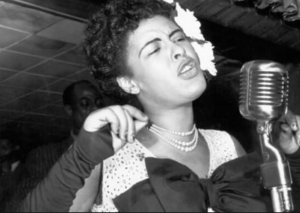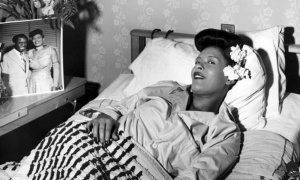Billie Holiday
Eleanora Fagan, more famously known as Billie Holiday, was a jazz singer that had a fundamental influence in the world of jazz music and pop singing. Holiday’s performance of Strange Fruit famously transformed conversations around race in the United States through exposing the realities of the immoral execution of African Americans in Southern America. Holiday utilized her platform to produce a performance that would then go onto to become an emblem of black resistance. Campaigners for anti-lynching laws would go on to use her performance as a means of expressing the horrors of the treatment of the black person in the United States.

Billie Holiday at a Jazz Club in 1931 © and courtesy the artist
Strange Fruit Performance- 1959
The 1930s in the United States were rife with racial discrimination and violence. Public lynchings — where many African American men were publicly killed — occurred frequently, primarily in the American South.
Although many blacks faced economic and social obstacles during this period, they viewed this time as a period of opportunity and progression. In the mid-twentieth century, there was a prominent transition on the outlook of slavery in America that drastically changed the black experience. Slavery was no longer widely accepted in America as it had been just half a century prior. This shift from slavery to ‘freedom’ was prominent because in many ways it allowed blacks the opportunity to reclaim their identity and transform the black experience.

Billie Holiday © and courtesy PhotoFest
Amid this climate, came Billie Holliday’s notable performance on the song, Strange Fruit. The song itself was originally a poem written by a white Jewish teacher in the Bronx, New York. Holiday would then take this poem, put it to music, and go on to sing and record her rendition on the song in 1939 in Harlem, New York.
The Harlem Ressinance was a prominent movement that granted many blacks the platform for change and transformation. Many black artists, male and female, utilized this platform to produce art forms that reclaimed the black experience and identity. Billie Holiday serves as an example of an individual who utilized these new opportunities to shed light on the vulgar reality of the black experience.
Please click the arrow to continue:
